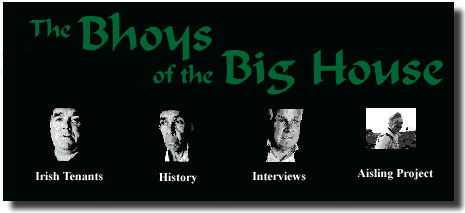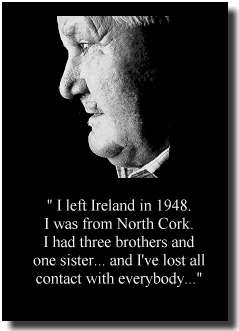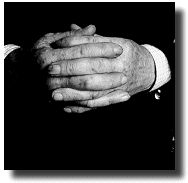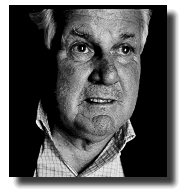
I left Ireland in 1948...
" I left Ireland in 1948...
I was from North Cork. I had three brothers and one sister. And I've lost all contact with everybody. I was working on the local farms and then I went to work in a sugar-beet factory - though I think that they're all closed down over there now. I worked there, but that was only winter-time. But when I started working on the farm - a lot of people won't believe it, but I worked for five shillings a week. And I had to milk six cows in the morning, before I got a cup of tea. Where I came from, there wasn't enough farms [to employ everybody]. The young fellas moved all over the place looking for work, like me, in 1948.
I was lucky. I had a trade. I worked in the old beet factory in Mallow and I picked up welding there - with the biggest bastard I ever worked for. He was a German; because there wasn't an Irishman who was capable of running the factory. The manager was a German, the machine master was a German, the electrician was a German; they were all German. And after a while, after about four years of my time [apprentice-ship], the Irish began to take over.
 My parents didn't even know I was leaving, ...for the NCB.
My parents didn't even know I was leaving, ...for the NCB.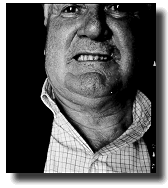
There was nothing in Cork, at all. There was no work. There may be now, I expect, but there was nothing at all, in them days. If you were lucky, you got work on a farm; and that was it. If you were working on a farm, you weren't supposed to come over here. They wouldn't give you a travel permit. It was like a passport and your photograph was on it. Two bits of cardboard folded over. At that time over here [England], as well, you had to have an identity card. And if the police pulled you up and you didn't have an identity card, you were nicked. And you had to have a ration book. They come off the ration in this country in 1952. And if you didn't have the ration book, you had no chance of getting digs. Because it was 4 oz.s of cheese a week, 4 oz.s of meat a week, 4 oz.s of this a week... I'm not joking. I was with one woman [landlady] in London, and she says -
" Oh, you've got an awful lot of sweet coupons on your ration book, what're you going to do with them?".
Well, she had two kids. So I said,
" Tear them out and get the sweets for the kids. I'm not going to eat sweets ".
And the only way you could get any bit of anything at all, was if you went into a shop, and he [the shopkeeper] was a bit bent. If you gave him a few bob extra, he'd give it to you without the coupons. It was blackmail - I don't know what else you'd call it.
The NCB paid my fare [over to England]. They've sacked them [coal-miners] all now , but they were looking for miners, in Ireland, then. There was ads in the Irish papers for the NCB, which was the National Coal Board. So, I signed on as a coal-miner. And then I had to get a travel identity card, I had to get this, that, and the other. So then I went from where I come from, into the railway station, and then I spent the night in Dublin. So, I got to Dublin, spent the night in a hotel bedroom, left at half past six from the North Wall in Dublin, for Liverpool.
It was a wicked [stormy] crossing. 
And then I went from there, to Sheffield, and then to that place outside Sheffield, called Wodehouse, which was a training centre for miners. I was there six months, and they said I was a miner. I was down a mine at Wodehouse, but that was the training mine, not a production pit. Would you like to go down 1000ft. or 2000ft., at 60ft. a second ?...[Shakes his head in denial] You couldn't get cigarettes at that time, but we got so many a week [because we were miners]. You had to pay for them, like. 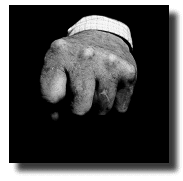
So, they shifted me from there to a production pit, at Atherstone, outside Coventry. I got there, and at that time, you had to have a ration book - I'm going back to 1948, and the early fifties, now. So, I went to this place, Atherstone, and it was a hostel with Nissen huts, a NCB hostel. So she [an NCB official] asked me for the ration book, which I had in my pocket, and I says,
" No, they never gave it to me, they said they'd send it on ".
So, I stopped there that night, anyhow. She gave me a ticket and she says :
" Go to the labour exchange, tomorrow morning, and they'll give you a 10 quid settling-in grant ". .
Now, 10 quid in those days was an awful lot of money...
So anyway, I decided, to HELL with this ! I'm not doing this craic, at all !.
So, I had the bag packed, already. I got the 10 quid, went out on the London road and [makes a "thumbing", hitch-hiking gesture] ...that's the last I saw of the mines! [Laughs]
But wasn't I the terrible one ? [laughs] - I wouldn't go down digging coal.
After that, I worked here, and I worked there, and I worked all over the place. I was a bit of a fitter-welder. I could get plenty of work. I worked all over the country. I worked with Sinclair & Clarke. Sinclair was a Scotswoman, and she was the boss, anyhow. She had the money. I worked all over the country with them. You could pack up here - on the building sites - walk 100 yards down the road:
"Any chance of a job?"
" Yeah !"
And you could pack up there, two days after that, and walk down the road again, and get another job. You can't do it today.
 I remember this town [Camden] out here, and it was like a cattle market in the morning, with subbies. Not only small subbies, but big subbies [major contractors]. Murphy, McAlpine... they were all there. You, you and you [makes pointing gesture] they'd pick you out. Go out there, now. And they were getting good money then. I knew blokes not two to three years ago, who were getting £50-60 a day. But the work is so scarce NOW, that the subbies can pick and choose, and they pay £25 and £30 a day, because if YOU don't take it, this bloke over here WILL.
I remember when I came over here first, you'd get to the digs and it was up in the window: "No Irish". Well, you can ask any of the bhoys.
I remember this town [Camden] out here, and it was like a cattle market in the morning, with subbies. Not only small subbies, but big subbies [major contractors]. Murphy, McAlpine... they were all there. You, you and you [makes pointing gesture] they'd pick you out. Go out there, now. And they were getting good money then. I knew blokes not two to three years ago, who were getting £50-60 a day. But the work is so scarce NOW, that the subbies can pick and choose, and they pay £25 and £30 a day, because if YOU don't take it, this bloke over here WILL.
I remember when I came over here first, you'd get to the digs and it was up in the window: "No Irish". Well, you can ask any of the bhoys. 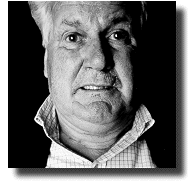
I worked for a few subbys. The biggest crook that ever walked, he was an agent [overseer] for Murphys - the 'Elephant' John . If you had a decent pair of shoes and you were going out for an 'oul shift, he'd put you on the muckiest and dirtiest job, that ever existed. There was a pub up in Hendon, 'The Welsh Harp', and he walked in there one night, and there was four blokes in there, and they were going to kill him, now, for different things [reasons]. He walked up to the bar on his own and he ordered seven pints of Guinness. One of the bhoys said,
" Ohhh, the mob [Elephant John's henchmen] are coming in now ".
After a while, the bhoys thought, where are they? They should be in, by now. John knocked his pint back, and he goes to the door and looked around, came back, drank another pint, went to the door, went out and never came back. Left the other five pints on the counter. He was on his own and he knew he was in trouble. Oh, there was the quare carry-on, going on. [Laughs].
Camden Town is dead now. All the pubs is gone 'yuppie', now, if you know what I mean. You've got the 'Rat 'n' Parrot' [formerly the 'Camden Stores', in Parkway] over there; the 'Elephant's Head' has gone all yuppie. The oul' market has taken over, here, Friday-Saturday-Sunday, and the pubs are open at ten o'clock in the morning, but only for coffee - supposed to be, know what I mean [grins]. Because, there's more pubs around this area than there is in any other part of London. I could name about fifty of them, now, within a mile radius. But they're all no good. A pint of Guinness over there in the Oxford, 2.10 for a pint of Guinness.
Camden Town is dead, now. It's finished. The pubs are still here, but they're all changed. Now you have a crowd that's calling every pub "O'Neills". And it's got the Irish writing on it. You can't afford to go into a pub in Camden Town, now.
You know the toilets out there on the High Street, at the junction? There's a little island, there. And that was called "the Pelican island", because on Sunday morning, come about ten to twelve, they'd [the Irish lads] all be their in their blue suits and their white shirts, and their black ties, waiting for twelve o'clock [pub opening time]. And that's why it was called 'Pelican island'. You ask any of the bhoys that knew it, around here. The blue suit, the white shirt, and the black, or blue, tie. A pelican is black and white, so that's why it got the name, 'Pelican island'. That one [pub] over there called 'the World's End', that used to be the Mother Redcap [famous for Irish traditional music sessions].
Oh, there used to be more punch-ups [in the Buffalo Ballroom] ! There were several ballrooms - I think 'The National' is still going in Kilburn. There was one in Tottenham Ct. Rd., the 'Shamrock' or something, and then there was one in Bayswater. There was one in the Elephant... I didn't go to the dances; I'd trip over me own feet ! I stuck to Irish pubs, because there was nothing else then ONLY Irish pubs.
[Sadly] The good times ended in the '70s, because the work wasn't about.
I'll stay here [in Arlington House]. I don't want to go back to Ireland, roaming around. Sure, I've nobody there. I'm happier here, than I would be over there. I could have walked out of here a month ago, and into a flat down the road. A lot have moved out, down to these flats and rooms, and then... they come back in here, again !
I've got a bed up there and they change it once a week, and I can have a bath, and a shower, when I wants it. I've got a wash-basin in the room, and they've got an old laundrette down there, so I can do a bit of laundry.
I'm quite happy.
Next birthday, I'm 71. Why should I move out of here, when I know people ? If anything happens to you here, you can scream.... y'know what I mean ?" [laughs].
|
